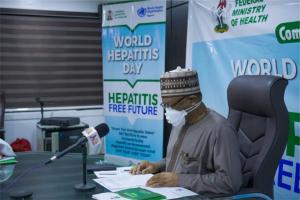World Hepatitis Day-In Nigeria, an estimated 20 million people are chronically infected
Abuja, 28 July, 2020 - To commemorate the 2020 World Hepatitis Day, the Minister of Health, Dr Osagie Ehanire says, in Nigeria, "We could estimate that about 20 million people are chronically infected with hepatitis B and C. Therefore, we recognize the importance of vaccination as a critical intervention in our determination to eliminate HBV infection by 2030.
The minister in company of WHO Representative to Nigeria (WR), Dr Walter Kazadi Mulombo shared this projection at a World Hepatitis Day commemoratory virtual press briefing today. This year’s theme is “Hepatitis-free future,” with a strong focus on preventing hepatitis B among mothers and newborns.
Five strains of the virus, Hepatitis A virus (HAV), hepatitis B virus (HBV), hepatitis C virus (HCV), hepatitis D virus (HDV) and hepatitis E virus (HEV) are responsible for viral hepatitis, which is an inflammation of the liver due to a viral infection. All the viruses can cause acute hepatitis, but only HBV and HCV frequently cause chronic hepatitis, which can lead to scarring of the liver (cirrhosis) and primary liver cancer
During the Press briefing, Dr Ehanire acknowledged the enormous contribution by WHO over the years towards attaining the highest levels of health by all Nigerians and elimination of Hepatitis through routine immunization, testing and treatment.
He said in 2018, Nigeria conducted a National AIDS Indicator and Impact Survey which showed a prevalence of 8.1 percent for Hepatitis B (HBV) and 1.1 percent for Hepatitis C (HCV).
The Minister who noted that Nigeria was one of the first African countries to introduce a birth dose of HBV vaccine in 2004 in alignment to a WHO Regional Resolution to reduce Chronic Hepatitis B Virus Infection to less than 2 percent in children under five years by 2020.
He, however, lamented that one of the major challenges previously faced to Hepatitis B birth dose vaccination was the inadequate domestic contribution to finance vaccines and expand access to services. This challenge has since been resolved with the adoption of a $3billion Nigeria Strategy on Immunization and PHC Systems Strengthening 2018 – 2028.
The Press briefing which also witnessed the launching of a book ‘Road to Set up a State Viral Hepatitis Programme’, is a culmination of week-long commemoratory activities being implemented across the country to amplify awareness towards elimination of the disease.
In his remarks at the event, Dr Mulombo commended Nigeria's efforts towards elimination of hepatitis, pointing out that the country is among 13 others making a difference on the continent in advancing implementation of hepatitis B birth dose. Furthermore, WR indicated that “WHO identifies with the country’s pioneering efforts of developing a Viral Hepatitis National Strategy by 2015 that ascribed to the Global ambition of eliminating viral hepatitis infection by 2030 on the basis of which notable achievements in routine immunization have been made as well as progressive availability of treatment.”
Dr Mulombo stressed to the media personnel that public awareness on Hepatitis remains important to encourage all adults who don’t know their status to go for screening for hepatitis B and C and children to get vaccinated against hepatitis B. The WR underscored this year’s theme of preventing mother-to-child transmission of Hepatitis B as well as scaling-up prevention, testing and treatment to control hepatitis B and cure for hepatitis C.
"If all children are protected with hepatitis B birth-dose vaccination within first 24 hours of life, hepatitis B which account for 85% viral hepatitis in our region, can be eliminated for the future generations. For current generation, testing and treatment remain mainstay path towards elimination of viral hepatitis B and C.
"We in WHO therefore look forward to providing our continued support as the country further improves coverage of these key services within the framework of primary health care strengthening towards universal health coverage and a #HepFreeFuture”, said Dr Mulombo.
World Hepatitis Day is commemorated each year on 28 July to enhance awareness of viral hepatitis, an inflammation of the liver that causes a range of health problems, including liver cancer.
Technical Contacts:
Dr Rex Mpazanje; Email: mpazanjer [at] who.int (mpazanjer[at]who[dot]int); Tel: +234 803 960 0874
Dr Oluwafunke Ilesanmi; Email: ilesanmio [at] who.int (ilesanmio[at]who[dot]int); Tel: +234 803 319 3137





